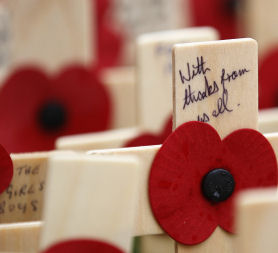Armistice Day: millions observe silence
Millions of people across Britain take part in the annual two-minute silence to remember those who have lost their lives in battle.
Armistice Day marks the anniversary of the end of the First World War. Germany and the Allies agreed a peace deal on the “eleventh hour of the eleventh day of the eleventh month” of 1918.
In the UK, Defence Ministers, military representatives, the Archbishop of Canterbury, veterans and school children attended a service at the Cenotaph in central London to commemorate Armistice Day. Wreaths were laid in front of the monument in Whitehall.
Parade Marshal Les Carter of the Western Front Association, who has arranged the service for the last 15 years and is retiring this year, said it was “very important” to continue to honour the sacrifice of soldiers in the 1914-1918 war.
“They were all volunteers – it was a civilian army,” he said. “We owe them a tremendous amount and we will remember them.”

Trafalgar Square
In Trafalgar Square in London, the Royal British Legion hosted Silence in the Square with the pop group The Saturdays, TV presenter Ben Shepard and actors Keeley Hawes and Ben Barnes. The Duke of Edinburgh visited the Field of Remembrance at Westminster Abbey (pictured above), laid out with poppies and small wooden crosses representing the fallen in conflicts from the First World War to Iraq and Afghanistan. He will also visit the Grave of the Unknown Warrior.
There was also a Service of Remembrance at the National Memorial Arboretum in Staffordshire, and the Field of Remembrance at Wootton Bassett officially opened today.
The Prime Minister, who is in Korea for the G20 summit, took part in a Remembrance Day service with other G20 leaders.
The service took place at the site of the British Army’s bloodiest battle since the end of the Second World War.
The 1st Battalion, Gloucestershire Regiment, were cut off and surrounded by Chinese Communist forces during the Battle of the Imjin River from 22-25 April in 1951, during the Korean War. Some 59 men died in the battle, and 526 were taken prisoner. Another 34 men died in captivity, and 180 were injured.
But their heroic stand, repelling waves of attackers for a full day and night, delayed the advance of the Communist troops and prevented a direct assault on the capital, Seoul.